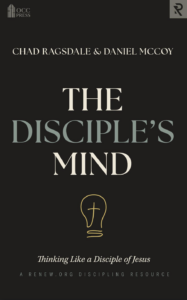What I am going to try to articulate here is something that has been on my mind for some time. The seeds of these thoughts were not planted by the assassination of Charlie Kirk (and the reactions to it), but the assassination did provide water for the seeds.
I have been dwelling on the difficulty of Colossians 2:8. It is a difficulty that, I’ll confess, is personal to me. I know that not everyone shares this difficulty, but many do. The difficulty is this: How do you warn people you love about dangerous and toxic ideas while also trying to avoid causing offense and stirring up controversy?
A dominant theme in Colossians (arguably THE dominant theme) is the supremacy of Jesus. The Colossian Christians were apparently being seduced by ideologies that were calling into question the sufficiency and sovereignty of a Jesus who is the “image of the invisible God” (Colossians 1:15) and in whom “all the fullness of the Deity lives in bodily form” (Colossians 2:9, NIV). Because of Christ’s supremacy, Paul exhorts these believers to have their lives “rooted and built up in him” (Colossians 2:7, NIV) and by extension, not have their lives rooted in anything else. This is the context of Colossians 2:8.
“See to it that no one takes you captive through hollow and deceptive philosophy, which depends on human tradition and the elemental spiritual forces of this world rather than on Christ.” (Colossians 2:8, NIV)
“See to it that no one takes you captive through hollow and deceptive philosophy, which depends on human tradition and the elemental spiritual forces of this world rather than on Christ.”
Paul knows what he’s talking about. This is a man who bears all the marks of being well versed in many of the prevailing philosophies of his day. His words here are not a blanket condemnation of philosophy, but he knows enough about philosophy to know that there are some ideas that will kidnap us if we aren’t paying attention.
Just like there is good medicine and bad medicine and good art and bad art, there is good philosophy and bad philosophy. Literally hollow and deceptive philosophy, empty ideas that deceive and captivate. These philosophies depend, he says, on human tradition and elemental spiritual forces of the world rather than on Christ.
“Elemental spiritual forces of the world” is a contended phrase with various interpretations. Without entirely rejecting the idea that deceptive philosophies may, in fact, be demonic in origin, I tend to think what Paul is saying here is that we must be careful not to be deceived by those things that have become “conventional wisdom” in our world. He would say in another letter that God has made the supposed wisdom of this world foolishness (1 Corinthians 1:20). It’s a similar sentiment here. You belong to Jesus, so be on your guard against any philosophy of this world that would kidnap you away from him.
“We must be careful not to be deceived by those things that have become ‘conventional wisdom’ in our world.”
This is all pretty straightforward, but here’s the difficulty. How do you preach or teach Colossians 2:8? How do you apply Colossians 2:8 to your life and to the lives of those who have been entrusted to you?
Because it strikes me that it is impossible to do this without causing conflict and distress.
The reason is simple to understand. A person who has been taken captive and seduced by a toxic philosophy will become fiercely protective of that philosophy. We develop a sort of Stockholm Syndrome when it comes to bad ideas. The hollow and deceptive philosophy will be regarded as the truth, and all attempts to convince the person otherwise will be regarded as a threat.
Steve Wilkens and Mark Sanford wrote a book several years ago called Hidden Worldviews. In the book, they discuss eight cultural stories that shape the way we see the world. What makes these stories so powerful is that they are usually hidden from us. They sneak into our beliefs and values and make their home there without us even recognizing that it has happened. Christians are vulnerable to these hidden worldviews because, like a parasite, these worldviews can latch onto and then twist beyond all recognition traditional Christian belief.
“We develop a sort of Stockholm Syndrome when it comes to bad ideas.”
Some of the worldviews discussed in the book are nationalism, consumerism, individualism, tribalism, and relativism. We could, of course, add to this list, but these hidden worldviews will sufficiently illustrate my point. It is impossible to preach or teach against these various -isms without inciting some level of conflict.
Tell a person that you are concerned they are being taken captive by nationalism and there is a decent chance you may be accused of lacking sufficient love for your country. Tell a person that they are giving in to the currents of toxic tribalism, and they may forcefully explain why their version of tribalism is actually Christlike. Question a person’s consumerism and you may be asked to mind your own business because after all, they aren’t nearly as consumerist as their neighbors.
We (including myself here) tend to be either hostile or dismissive towards those iconoclasts who challenge the authority of our idols. Act out the principle of Colossians 2:8 and there is a high probability that you will be accused by someone of stirring up controversies. Others may even call you hateful, closed-minded, or anti-Christ.
So what should we do?
Being silent is an option, I suppose. I don’t want to dismiss this option too quickly because Scripture does encourage the virtue of silence especially when speaking becomes a pretext for anger. There is something to be said about not trying to fight every battle at all times. Sometimes a silent prayer as you walk away from a potential fight is the best course for you and for the other person. At the very least, we should all be pausing and collecting our thoughts before we start toppling idols. I can testify that offering a quick, half-baked response is one of the best paths to misunderstandings and damaged relationships.
“Act out the principle of Colossians 2:8 and there is a high probability that you will be accused by someone of stirring up controversies.”
In saying this, I believe that there are also moments where silence is an abdication of duty, especially for those in leadership. We shouldn’t allow the mere possibility of conflict to detract us from speaking the truth. This would amount to a “heckler’s veto” where our ability to speak is limited by the loudest voices of opposition. According to the heckler’s veto, we shouldn’t question hollow and deceptive philosophies because it might upset those who believe in those hollow and deceptive philosophies. We are called to pursue peace, but this doesn’t mean that we must be non-threatening and safe, avoiding even the possibility of conflict. This is the Aaron Burr mentality. To be a Christian in this world means that we should learn to “speak less and smile more.” Be non-threatening. Never let them know what you are against or what you are for.
There is a twofold reality that we must recognize. We must warn others of hollow and deceptive philosophies and we need to be prepared for conflict when we do so. Recognizing that twofold reality, there are some principles that I believe should guide us in applying Colossians 2:8.
Be humble
Jesus of course warned us about the dangers of pointing out a speck of sawdust in our brother’s eye. Toppling idols is a wonderful way to engage in self-righteous behavior: I, and I alone, am faithfully doing the work of Jesus by calling out all of the idolatry in your life. It is remarkable to me how many people fight idolatry with their own idolatry. We fight nationalism with left-wing statism. We fight consumerism with thinly disguised Marxism. We fight individualism with some mutated collectivism. We criticize the failures of purity culture and legalism with the sexual permissiveness of expressive individualism which is many times worse. If you are going to call out hollow and deceptive philosophies, you had better make absolutely certain that you have called them out in your own life first.
“It is remarkable to me how many people fight idolatry with their own idolatry.”
Be kind
Stated another way, don’t be a jerk. Niceness is not a fruit of the Spirit, but kindness is. Toppling idols is not always nice, but we are not absolved from the necessity of being kind. The opposite of kindness is offering cheap ad hominem arguments that demonize your opponents. This type of labelling has become epidemic especially in online spaces. There is a consistent pattern. Rather than dealing with the substance of beliefs, we label and reject. This is usually done in a performative way that rejects even the possibility of a deeper dialogue.
Instead of ad hominem arguments, we should care deeply about the person who we are disagreeing with. If it is true that they have been taken captive by hollow and deceptive philosophies, shouldn’t our hearts break for them? Instead of offering vile labels, shouldn’t we attempt to understand them in order to engage more effectively with them? Doesn’t Jesus call us to be charitable to those who have gone astray? If you don’t want the best for those you are challenging, you’re just engaged in sophistry which is not at all in the Spirit of Christ. I’ll put it simply. If you’re engaging in ad hominem arguments, you’re the bad guy. You are wrong even if you are right.
Be informed
Colossians 2:8 requires us to be knowledgeable about those philosophies that deceive us. For this reason, iconoclasts need to be learners and listeners. They have to be willing to engage in debate about complicated issues. They have to be willing to put their own ideas to the test. They need to be able to appreciate difficult topics from multiple perspectives and with appropriate nuance. In this way, we are more surgeons than soldiers when it comes to tackling hollow and deceptive philosophies.
It is too often the case that rather than being informed on an issue, we settle for the accepted narrative that we have been given on that issue. I don’t know how many times I saw this happen after Kirk’s assassination. Too many people were just uncritically repeating talking points. You can’t warn people about hollow and deceptive philosophies if you have become an unthinking vessel of hollow and deceptive philosophies.
“You can’t warn people about hollow and deceptive philosophies if you have become an unthinking vessel of hollow and deceptive philosophies.”
Be accountable
We all get it wrong from time to time. How do we know when our warnings about toxic ideas have become toxic themselves? How do we know when our engagement has become unloving and calloused? How do we know when we should engage in some silence? Well, the best answer I know of is to have people in your life that you are accountable to. The iconoclast who listens to no one other than himself is going to do a lot of harm to himself and others. Also, if you are not deeply invested in and accountable to a local church, I’m not sure anyone should listen to any of your pontifications about what is wrong with Christians and the church.
Be resilient
It is difficult to challenge ideas that have become cultural conventions. You may be hated and harassed, misunderstood and slandered. You will often be dismissed as a hack. People will shake their heads at how far you’ve fallen. It’s tempting to feel sorry for yourself but resist that temptation. It’s tempting to take criticism personally but resist that temptation. That temptation is rooted in another hollow and deceptive philosophy which tells us that the most important thing in life is our own ego. It is better by far to continue to calmly stand upon your convictions with humility and grace.
“It is better by far to continue to calmly stand upon your convictions with humility and grace.”
This leads to the last, but most important principle…
Be faithful
Specifically, I mean remain faithful to Jesus and the message of the gospel. Remember that Paul was first and foremost pointing the Colossians to Jesus. Anything that takes away from Jesus is a hollow and deceptive philosophy. Challenging toxic ideas should always point us in the direction of Jesus.
Justin Bailey wrote a book several years ago, Interpreting Your World, where he talked about two different kinds of iconoclasm, cancellation and complication. Cancellation is the forceful removal of an idol through direct action. Complication is the addition of Jesus to the company of idols. Both approaches can be appropriate, but complication might be the most effective in our world today. Complication is what Paul did in Athens. He complicated the worship of the Athenians by introducing Jesus.
Our society is no less religious than ancient Athens. We should work to complicate the idolatry of our day by introducing the Lord Jesus as that unknown or obscured God that our idolatry is missing. The realness of Jesus undermines our hollow and deceptive philosophies by exposing them for what they are.
From chadragsdale.wordpress.com. Used with permission.












One Response
“If the rule you followed brought you to this, of what use was the rule?”, a line from the novel, No Country for Old Men, cited by a young man in a recent WSJ article about his descent into darkness via internet rabbit holes. He thought of this line when he looked at where his pursuit had landed him and it was the start of turning his life around. I’m guessing he’s not alone among those who’ve discovered, often painfully, where empty philosophies can get you.